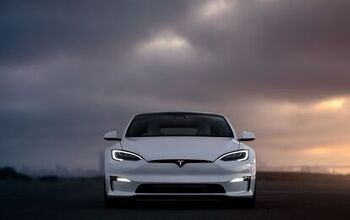Study Claims Gen Z Doesn't Like Buying Cars

Younger drivers have reportedly had it with the dealership experience, with Gen Z even more disenfranchised than Millennials. Though it’s difficult to imagine anybody visiting a showroom within the last 12 months having any other reaction. Incentives are down, prices are up, and there’s a good chance whatever you wanted to buy isn’t going to be on the lot anyway. Someone saying they had an exemplary dealer experience is becoming about as common as people claiming they enjoy going to the DMV.
However, CDK Global Inc. still opted to conduct a survey in the hopes of determining just how much less tolerant younger shoppers might be compared to older generations. The takeaway probably isn’t going to shock you, even if the sheer volume of first-time buyers that don’t care for dealerships might.
The study, which was released on Thursday and subsequently shared by Automotive News, polled 1,100 recent car buyers in December 2021 and analyzed their preferences and hardships during the car-buying process — breaking down the results by age. CDK classified Gen Z as car buyers from the ages of 18 to 25, Millennials as 25 to 40, Gen X as 40 to 55, and Baby Boomers as individuals aged 56 and over.
From AN:
CDK said 81 percent of Gen Z members said their biggest priority when purchasing a car was taking their time and exploring all of their options, compared with only 73 percent of millennials, 60 percent of Gen Xers and only 45 percent of baby boomers. The survey also said members of Gen Z had more difficulty purchasing a vehicle online than older generations.
Brendan Dougherty, CDK’s director of product marketing, attributed this trend to 56 percent of Gen Z respondents telling CDK that they were making their first car purchase.
“For most of these consumers, this is their first major purchase, and they come in with some assumptions that they could do more of this thing online than what they really can do, because of the complexity of a car transaction,” Dougherty told Automotive News.
Luxury vehicles were also more popular among Gen Z, according to the survey, with 39 percent of buyers purchasing a luxury car compared with 27 percent of Gen X buyers and 12 percent of baby boomers.
That’s rather interesting since we know that Millennials hold almost 7 percent of the nation’s wealth today. By contrast, Boomers held 22 percent of the national wealth at the same age based on data provided by the Federal Reserve. Considering that this trend is presumed to expand over time, one would assume that Gen Z would be in even worse financial shape — not to mention having less time on Earth to accrue their finances. But it’s no secret that a lot of people purchase cars that are well out of their price range.
While your author would argue that the majority of today’s luxury vehicles aren’t really offering more bang for the proverbial buck than in past eras, marketing still makes them out to be a cut above their mainstream peers, and loan terms have expanded to a point where it’s not uncommon to see people paying a vehicle off for at least 70 months. Another possible explanation is that a majority of young adults (18-29) now live at home with their parents, even if they’re gainfully employed. By avoiding rent or mortgage payments, there’s a chance that a subset of Gen Z simply has more disposable income and has elected to throw that money at premium marques.
Regardless, the big takeaway from the study was that Gen Z doesn’t actually seem to like the process required to get into a new car and is far less likely to own one — be it fancy or humble. Almost half (45 percent) of Gen Z respondents told CDK they were frustrated by having to wait for a salesperson when going to a dealership and were the least likely age group to recommend any dealership to a friend or family member. The group likewise wanted to have a comprehensive understanding of their options over older individuals and took more time out of their week before making a final decision.
“[Gen Z] said that they wanted someone to help them, they wanted to take their time, but they also still valued speed,” explained Dougherty.
CDK basically exists to figure out ways of making the automotive sector money and often works directly with dealerships, so there’s some reason to believe the survey isn’t another attempt to undermine the dealer model so automakers can commence direct sales. Joe Tautges, chief operating officer of CDK Global, suggested dealers might benefit from streamlining the buying process while taking additional time to work directly with a customer to help them understand features while catering to their specific needs. But the company also works with manufacturers that seem to be advancing direct sales, so take all of the above with a grain of salt.
There are a lot of factors to consider here. Younger generations are not incurring the kind of wealth their parents did at the same stages of life, so big purchases have a lot more riding on them. We’ve already seen this with the housing market becoming prohibitively expensive after 2006. The number of renters living in the U.S. continued to climb while homeownership rates stayed relatively stagnant.
Vehicles have likewise grown substantially more cash-intensive over the last couple of years, forcing some people to spend more on a vehicle they can afford — rather than the one they actually wanted. This alone may be all there is to Gen Z having a lower tolerance for visits to the dealership and spending more time browsing for cars — with the issue potentially made worse by the current situation, where options are comparatively limited and haggling has nearly gone out the window.
Ultimately, these kinds of studies feel extremely familiar to the ones we saw for years citing that Millennials were buying fewer cars than their parents had. We’re just further down the path now, with the average American having even less economic freedom than before. The obvious solution is to get more money into the pockets of regular people to deliver a healthier and more stable automotive market. Something tells me the days of being able to overcharge customers are about to come to an end. But it has also historically been a lot easier to talk about fixing a broken market than actually getting the job done.
[Image: Gretchen Gunda Enger/Shutterstock]

A staunch consumer advocate tracking industry trends and regulation. Before joining TTAC, Matt spent a decade working for marketing and research firms based in NYC. Clients included several of the world’s largest automakers, global tire brands, and aftermarket part suppliers. Dissatisfied with the corporate world and resentful of having to wear suits everyday, he pivoted to writing about cars. Since then, that man has become an ardent supporter of the right-to-repair movement, been interviewed on the auto industry by national radio broadcasts, driven more rental cars than anyone ever should, participated in amateur rallying events, and received the requisite minimum training as sanctioned by the SCCA. Handy with a wrench, Matt grew up surrounded by Detroit auto workers and managed to get a pizza delivery job before he was legally eligible. He later found himself driving box trucks through Manhattan, guaranteeing future sympathy for actual truckers. He continues to conduct research pertaining to the automotive sector as an independent contractor and has since moved back to his native Michigan, closer to where the cars are born. A contrarian, Matt claims to prefer understeer — stating that front and all-wheel drive vehicles cater best to his driving style.
More by Matt Posky
Latest Car Reviews
Read moreLatest Product Reviews
Read moreRecent Comments
- Mason Had this identical car as a 17 year old in the late 90's. What a ball of fun, one of many I wish I still had.
- FinnEss At my age, sedans are difficult to get into without much neck and hip adjustment.I apologize sincerely but that is just the way it is. A truck is my ride of choice.Pronto
- Ajla The market for sedans is weaker than it once was but I think some of you are way overstating the situation and I disagree that the sales numbers show sedans are some niche thing that full line manufacturers should ignore. There are still a sizeable amount of sales. This isn't sports car volume. So far this year the Camry and Civic are selling in the top 10, with the Corolla in 11 and the Accord, Sentra, and Model 3 in the top 20. And sedan volume is off it's nadir from a few years ago with many showing decent growth over the last two years, growth that is outpacing utilities. Cancelling all sedans now seems more of an error than back when Ford did it.
- Duties The U.S . would have enough energy to satisfy our needs and export energy if JoeBama hadn’t singlehandedly shut down U.S. energy exploration and production. Furthermore, at current rates of consumption, the U.S. has over two centuries of crude oil, https://justthenews.com/politics-policy/energy/exclusive-current-rates-consumption-us-has-more-two-centuries-oil-report.Imagine we lived in a world where all cars were EV's. And then along comes a new invention: the Internal Combustion Engine.Think how well they would sell. A vehicle HALF the weight, HALF the price that would cause only a quarter of the damage to the road. A vehicle that could be refueled in 1/10th the time, with a range of 4 times the distance in all weather conditions. One that does not rely on the environmentally damaging use of non-renewable rare earth elements to power it, and uses far less steel and other materials. A vehicle that could carry and tow far heavier loads. And is less likely to explode in your garage in the middle of the night and burn down your house with you in it. And ran on an energy source that is readily extracted with hundreds of years known supply.Just think how excited people would be for such technology. It would sell like hot cakes, with no tax credits! Whaddaya think? I'd buy one.
- 3SpeedAutomatic I just road in a rental Malibu this past week. Interior was a bit plasticity, but, well built.Only issue was how “low” the seat was in relation to the ground. I had to crawl “down” into the seat. Also, windscreen was at 65 degree angle which invited multiple reflections. Just to hack off the EPA, how about a boxy design like Hyundai is doing with some of its SUVs. 🚙 Raise the seat one or two inches and raise the roof line accordingly. Would be a hit with the Uber and Lyft crowd as well as some taxi service.🚗 🚗🚗


































Comments
Join the conversation
Why should we put up with the same problems imposed upon society for literal generations when there is a better way? Why pay for cable TV when we can get entertainment on our schedule and practically free of charge?
Between several friends and neighbors who have Gen Z kids going to college, they all hate cars. They want nothing to do with cars. They all want to move to cities that have mass transit, even if they don't like everything else that comes with large cities.